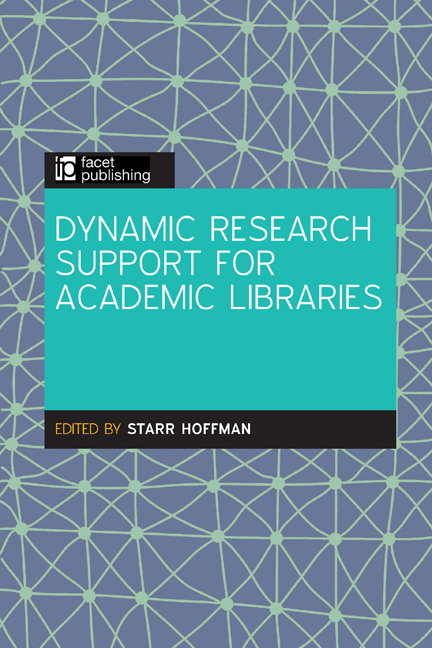Book contents
- Frontmatter
- Contents
- Editor and contributors
- Preface
- Introduction: a vision for supporting research
- PART 1 TRAINING AND INFRASTRUCTURE
- PART 2 DATA SERVICES AND DATA LITERACY
- PART 3 RESEARCH AS A CONVERSATION
- Introduction to Part 3
- 7 Implementing open access across a large university: a case study
- 8 Bridging the gap: easing the transition to higher education with an information literacy MOOC
- 9 Metadata enhancement through name authority in the UNT Digital Library
- Index
8 - Bridging the gap: easing the transition to higher education with an information literacy MOOC
from PART 3 - RESEARCH AS A CONVERSATION
Published online by Cambridge University Press: 08 June 2018
- Frontmatter
- Contents
- Editor and contributors
- Preface
- Introduction: a vision for supporting research
- PART 1 TRAINING AND INFRASTRUCTURE
- PART 2 DATA SERVICES AND DATA LITERACY
- PART 3 RESEARCH AS A CONVERSATION
- Introduction to Part 3
- 7 Implementing open access across a large university: a case study
- 8 Bridging the gap: easing the transition to higher education with an information literacy MOOC
- 9 Metadata enhancement through name authority in the UNT Digital Library
- Index
Summary
Introduction
What do students need to learn to get the most out of their academic studies? How can the library support their learning process in the best possible way? Are our current information literacy (IL) classes what we want them to be?
After repeatedly asking ourselves these questions, we gradually realized we needed to refocus and adjust our teaching and learning services to meet the needs of new students. Thus, the iKomp MOOC (Massive Open Online Course) was born, and with it a chance to introduce modern teaching methods in our IL instruction, together with a more dialogue-based communication with first-year students.
The main trigger for starting to change how we teach information literacy at our university came from feeling that we, in some respects, failed in reaching the students with our instruction. With the norm being one or two classes with each student group during their first term, we had a lot to say and sadly not enough time in which to say it. Our lectures were packed with all the wonderful stuff that we as librarians know could help the student's research and learning process. Feedback from attending students was usually very good, but what did they really learn? Moreover, what about those students who for some reason did not attend?
As we created a MOOC to address these challenges, another important factor dawned on us. Many of the students who tested the beta version of iKomp repeatedly mentioned the gap between secondary and higher education. Reflecting on this issue, we understood more clearly the importance of the library's learning support services. Young people enter universities and colleges with a varying set of expectations, learning skills and basic knowledge. Similarly, higher education faculty have their own expectations of their students. These two sets of expectations are not necessarily in agreement.
In this chapter, we describe the development of our MOOC, entitled iKomp and created at UiT, The Arctic University of Norway, in the period 2013–15 (http://ikomp.no). The chapter is organized as follows: first, we present iKomp and then we expand on the needs that caused us to develop it.
- Type
- Chapter
- Information
- Dynamic Research Support for Academic Libraries , pp. 119 - 132Publisher: FacetPrint publication year: 2016



